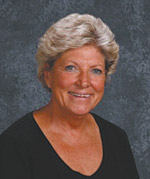January 28, 2013
The Golden Rule
 By Mary Schricker Gemberling
By Mary Schricker Gemberling
I am a newspaper reader! Almost every morning, I pour myself a cup of coffee, turn on the Today show and settle down to read the paper. By knowing what is going on in the world, I feel I am better prepared to understand viewpoints, weigh both sides of the issues and make educated decisions about how best to go about living a balanced life. But, I have to tell you the news lately has been disturbing. Like so many others I am having trouble finding that equilibrium.
My pollyanna-like approach to life usually causes me to focus on the good in the world and sweep the rest under the rug, but even I am having a hard time doing that these days. The distressing daily news started with the weather reporting the worst drought in our country since the days of the dustbowl. The late summer and fall brought a rash of destructive storms culminating in “Sandy,” which left over 250 dead and thousands homeless from Haiti to the Eastern coast of the United States. On the heels of Thanksgiving, our human spirit was shaken to the core with the massacre of innocent children and the dedicated teachers trying to save their students. We witnessed a governing body who pitted the wealthy against the poor, while amassing billions of dollars of debt for our children and grandchildren to reconcile. In the middle of all of this, the true meaning behind the holiday season was threatened by desperate and greedy employers.
Lots of blame has been pointed at specific groups and laws or the lack thereof. The issues of gun control, mental health, government aid to victims, security in our schools, violence of video games, and the safety of small town America have all been in the forefront. Not one of the above nor all of the above is to blame, but the ire of the average American has surfaced. Future business leaders, politicians, scientists, doctors, and philosophers are emerging. Facebook and other social media are full of campaigns to do good deeds and be kinder to each other. The spirit of giving to those who are less fortunate that permeates our society from the end of November to Christmas seems to be continuing. Is this the good that maybe comes out of the death and destruction that has become a part of our consciousness? Can we become a better society prevailed by people who really do “treat others as they would like to be treated”? Or will we forget once the horrific images fade, and return again to our own self -serving daily routines.
I can’t help but think of one of my favorite pieces written by Robert Fulgham, “All I Ever Really Needed to Know I Learned in Kindergarten:”
“Most of what I really need to know about how to live, and what to do, and how to be, I learned in Kindergarten. Wisdom was not at the top of the graduate school mountain, but there in the sandbox at nursery school.
These are the things I learned: Share everything. Play fair. Don’t hit people. Put things back where you found them. Clean up your own mess. Don’t take things that aren’t yours. Say you’re sorry when you hurt somebody. Wash your hands before you eat. Flush. Warm cookies and cold milk are good for you. Live a balanced life. Learn some and think some and draw and paint and sing and dance and play and work some every day.
Take a nap every afternoon. When you go out into the world, watch for traffic, hold hands, and stick together. Be aware of wonder.
Remember the little seed in the plastic cup. The roots go down and the plant goes up and nobody really knows how or why, but we are all like that.
Goldfish and hamsters and white mice and even the little seed in the plastic cup – they all die. So do we.
And then remember the book about Dick and Jane and the first word you learned, the biggest word of all: LOOK. Everything you need to know is in there somewhere. The Golden Rule and love and basic sanitation, ecology and politics and sane living.
Think of what a better world it would be if we all, the whole world, had cookies and milk about 3 o’clock every afternoon and then laydown with our blankets for a nap. Or, if we had a basic policy in our nation and other nations to always put things back where we found them and clean up our own messes. And it is still true, no matter how old you are, when you go out into the world, it is best to hold hands and stick together.”
Mary Schricker Gemberling, former educator and Seniors Real Estate Specialist, is the author of two books: The West End Kid and Labor of Love.
Filed Under: Community, Health & Wellness
Tags: Business Leaders, Cup Of Coffee, Dedicated Teachers, Destructive Storms, Dustbowl, Equilibrium, Golden Rule, Good Deeds, Governing Body, Government Aid, Gun Control, Health Government, Holiday Season, Human Spirit, Innocent Children, Living A Balanced Life, Philosophers, Pollyanna, True Meaning, Viewpoints
Trackback URL: https://www.50pluslife.com/2013/01/28/the-golden-rule/trackback/


